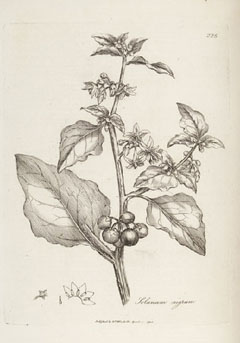Petimorel (Garden nightshade)
Dioscorides writeth, that Nightshade is good against S. Anthonies fire, the shingles, pain of the head, the heart-burning or heat of the stomach, and other like accidents proceeding of sharp and biting humors. But although it hath these virtues, yet it is not always good that it should be applied unto those infirmities, for that many times there happeneth more dangers by applying these remedies, than by the disease it self....It is not good that S. Anthonies fire should be driven from the outward parts to the inward....It is necessary that S. Anthonies fire should break forth, and that it is to death to have it driven in: which is to be understood not only of S. Anthonies fire, but also of other like burstings out procured by nature. For by using these kinds of cooling and repelling medicines, the bad, corrupt, and sharp humors are driven back inwardly to the chief and principal parts, which cannot be done without great danger and hazard of life....
The juice of the green leaves of garden Nightshade mixed with Barley meal, is very profitably applied unto S. Anthonies fire, and to all hot inflammations....
The bark of the root of sleepy Nightshade...hath a somniferous quality, yet is it milder than Opium, and the fruit thereof vehemently provokes urine. But (as Pliny saith) the remedies hereof are not of such esteem that we should long insist upon them, especially seeing we are furnished with such store of medicines less harmful, yet serving for the same purpose.
Gerard, p. 339-40.
Woodville, A supplement to Medical botany, p. 226. Courtesy of the Missouri Botanical Garden.
